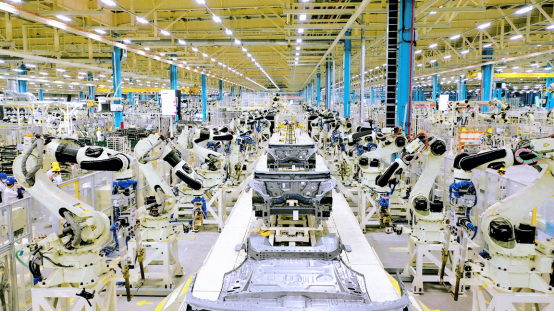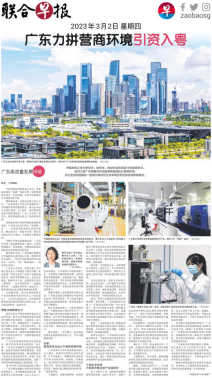“Foreign investment in Guangdong mainly falls into three types: foreign trade-oriented, manufacturing-oriented, and service-oriented. In recent years, service-oriented foreign-funded enterprises have shown a rapidly increasing trend,” Joanne Wang, Guangdong Markets Leader of PwC China, told GDToday and Lianhe Zaobao at a joint interview on the high-quality development in Guangdong, the province perceived as the economic engine of China.
She took Shenzhen as an example, saying that the city’s actual use of foreign investment in the high-tech industry hit 4.5 billion USD in 2022, accounting for 41 percent of the city’s total. The actual use of foreign investment in the high-tech service industry increased by 13 percent year-on-year, indicating a rise in the quantity and quality of foreign investment.

Qianhai, Shenzhen [Photo/ Nanfang Daily]
Business environment to be improved for quality growth
The Guangdong government vowed to boost high-quality development at a grand conference held on January 28, the first working day after the Chinese New Year holiday, which indicates a shift in focus from quantitative economic indicators to sustainable and environmentally-friendly growth.
To draw in investment and boost the economy, emphasis is also placed on efforts to improve the business environment for foreign companies. Guangdong Governor Wang Weizhong said at the conference that Guangdong would implement the national treatment of foreign-funded enterprises, expanding their market access and ensuring that they can participate in government procurement, bidding, and standard-setting on an equal footing in accordance with the law.
“Lots of European companies have settled in Guangdong due to its business environment. The province has sophisticated transport networks and complete industrial supply chains, while offering great market potential with the trend of technological innovation and digitization in the Guangdong-Hong Kong-Macao Greater Bay Area,” said Klaus Zenkel, Vice President of the EU Chamber of Commerce in China and Chairman of the European Chamber South China Chapter.
As of the end of 2021, Guangdong Province has approved the establishment of nearly 289,000 foreign-invested enterprises, ranking first in China in terms of utilizing foreign investment. 13,365 foreign-funded enterprises were newly registered in the province in 2022.
Joanne Wang explained that policy transparency, government efficiency and tax costs are the three factors that foreign-funded enterprises are concerned with most when uating a business environment. Now that digitization has made China’s government services almost the most efficient in the world, she suggested that the government could improve its services by strengthening policy guidance and introducing more measures to benefit enterprises, especially SMEs.
Klaus Zenkel added that factors such as intellectual property rights protection, tax incentives as well as the supply of green energy are key to foreign companies when it comes to high-quality and sustainable development.
Guangdong is drafting an action plan to optimize the business environment, addressing issues such as the inadequate implementation of policy documents and prominent feedback from enterprises. It will also build a batch of pilot areas for business environment reforms and develop them into preferred destinations for domestic and foreign enterprises to invest in Guangdong, according to Huang Huadong, Deputy Director-general of the Guangdong Development and Reform Commission.
Position in global supply chain maintained withfocus shifted
Some foreign companies, including Toshiba and Samsung, have relocated their production lines from China to Vietnam, Thailand and other Southeast Asian countries over the past two years, sparking discussions about China’s changing position in the global supply chain.
Klaus Zenkel considers it more of a China Plus One Strategy that has been adopted by most multinational companies, that is, setting up factories in both China and other countries, to ensure a more flexible and complete supply chain ecology.

The GAC TOYOTA production line [Photo/Nanfang Daily]
“The relocation is a normal decision-making process of specific companies and does not mean that foreign companies are no longer confident in China. Our Business Confidence Survey shows most companies would like to stay in China and have no plan to move away from the country,” Zenkel furthered.
Joanne Wang said the manufacturers which have relocated to Vietnam or other Southeast Asian regions have not yet shown particularly good economic benefits.
“China has maintained an important position in the global supply chain and served the global market for a long time with a complete range of industries, well-developed infrastructure and abundant industrial professionals. However, Vietnam, Myanmar and other places lack these elements, so companies must face these problems after the relocation,” Joanne Wang analyzed.
Based on the Guangdong Government Work Report, the province will adopt a new pattern of investment promotion in 2023 and attract domestic and foreign capital to the entire industrial chain. It will prioritize technological and manufacturing enterprises with strong competitiveness.
Wang Jun, former President of the Guangdong Academy of Social Sciences, said that compared with the labour-intensive industries such as furniture, clothing, and textiles in the 1980s and 1990s, future competition and opportunities lie in high-tech manufacturing and services. Provinces and regions of China are now putting solid efforts into attracting foreign investment in these sectors.

GDToday conducts a joint interview with Lianhe Zaobao, the biggest Chinese media outlet in Singapore, on the trend of high-quality development in Guangdong.
Reported by Jasmine
Edited by Wing, Steven, James
版权及免责声明:凡本网所属版权作品,转载时须获得授权并注明来源“英国富中传媒”,违者本网将保留追究其相关法律责任的权力。凡转载文章,不代表本网观点和立场。版权事宜请联系:619378122@qq.com。